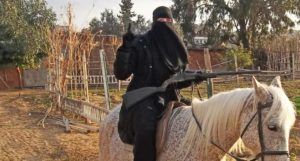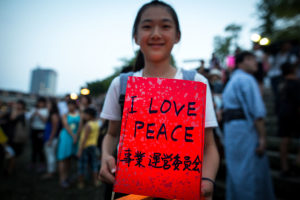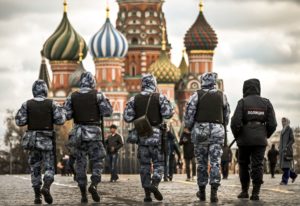The 52 Irish politicians who found themselves banned from Russia last week responded with varying degrees of surprise and sarcasm. Traditionally seen as politically “soft” on Russian aggression, Ireland has been increasingly vocal in its support for Ukraine — and has been met with accusations of “fuelling Russophobic hysteria” from the Kremlin. But the sanctions, and the reaction to them, largely obscure an awkward fact: Ireland has a significant political faction that does not support Ukraine’s war efforts.
This faction was dragged into the spotlight earlier this year by the wife of Irish president Michael D. Higgins, Sabina, who wrote a letter to the Irish Times calling for peace. While Ukrainian soldiers were countering an invasion into their internationally recognised territory, with near-total support from Western countries, Higgins seemed reluctant to come down on one side: “Until the world persuades President Vladimir Putin of Russia and President Volodymyr Zelenskyy of Ukraine to agree to a ceasefire and negotiations, the long haul of terrible war will go on. How can there be any winner?”
This is a nation with a national anthem entitled “The Soldier’s Song”. Our war for independence is the most deified part of our history books. Higgins’s decision to publish the letter on the president’s official website drew criticism from many Irish politicians: Fine Gael Senator John McGahon described it as “inappropriate, unhelpful and distasteful”. Higgins was supported, though, by Yuriy Filatov, Russia’s ambassador to Ireland who commented that her views “make sense”. “She’s against war. We’re all against war,” he told the Irish Times.
Higgins was lambasted, but her views aren’t unusual: she represents a significant far-Left camp in Ireland’s politics — one that uses the vague term “anti-war” to justify defanging the Irish military and, at its extremes, acts as an incubator for authoritarian sympathisers. These far-Leftists are known as the Tankies — a term initially used to describe those who supported the use of tanks to crush opposition in occupied areas of the Soviet Union, but is now commonly used to describe those sympathetic to Left-wing authoritarian regimes. In Ireland, it’s not uncommon for the Tankies to justify the actions of dictatorships by employing a toxic mix of whataboutery and generalised condemnation of western powers.
The Tankies aren’t fringe. While the far-Left in other EU countries remain on the outskirts of politics, in Ireland it has significant political sway. Encompassing members of the European Parliament, grassroots political organisers, national politicians and even the deputy speaker of the Irish Parliament, Catherine Connolly, Ireland’s far-Left are a loud minority with senior political positions.
They therefore have the power to shape international policy. In 2017, far-Left Irish politicians and activists travelled to Syria, having obtained visas from a man working with the dictatorship of Bashar Al Assad. The group comprised of several TDs (MPs) and future MEPs, as well as Connolly, who was yet to become deputy speaker. It arrived in Damascus at the same time as a Russian delegation. At this point, relations between the Syrian regime and most European governments were frosty to say the least, and the delegation was criticised by many in Ireland.
They were right to worry. Previously, one of the delegation’s members, former TD Maureen O’Sullivan, had advocated in the parliament for the Iranian regime to act as peacekeepers in Syria, a regime that is currently embroiled in the brutal suppression of a popular protest movement. And a month after their return from Syria, the group supported a motion to lift sanctions on the nation. (“It is following a visit to Syria and a tremendous amount of research that we stand here tonight to say we do not support the sanctions,” said Connolly.) The move shocked many in parliament — as well as Syrian activists, who accused the politicians of repeating pro-regime talking points.
Five years later, in the early days of the Ukraine war, Connolly (now deputy speaker) and several other TDs, along with activists and academics, formed The Irish Neutrality Group. Irish troops were being volunteered to train soldiers in Ukraine in skills like demining: this was part of the Tankies’ panicked response.
It was popular support for Ukraine in Ireland that caused an overdue backlash against this motley, oft-ignored group. They have peddled the narratives of authoritarian regimes in Syria, Iran and Venezuela for years, and gone unnoticed. But they made headlines when they refused to applaud Zelensky’s address in Ireland’s parliament — and after making continuous requests for him to negotiate with Russia.
This strange standpoint is also in evidence among the Irish Left across the border. Sinn Féin decries human rights abuses at home, within Ireland’s robust democracy. But it also has an MP who in 2017, after being vetted, was invited by the government of Venezuela to participate in a fake election observation: a practice where carefully chosen politicians, activists and trade unionists are invited to countries whose elections are widely seen as undemocratic. These countries often prohibit traditional election monitoring missions in lieu of these “sympathetic” delegations. Despite widespread criticism of the 2017 elections in Venezuela, MP for Newry and Armagh Mickey Brady described them as “fair and equitable”.
Meanwhile, we have Clare Daly and Mick Wallace, Irish MEPs from the Independents for Change party — a party that does not have an accessible membership portal. Both have been invited (by the government of Nicaragua in 2021 and Venezuela in 2020) to observe elections that have excluded recognised bodies and are widely seen as fraudulent. Both MEPs previously lauded the 2021 Syrian elections. And Wallace is known for often supporting Chinese positions on human rights issues — he has downplayed the repression of Uyghurs, for instance. China being a country that doesn’t even bother to hold fake democratic elections, of course. The very same Wallace has complained about EU military support for Ukraine, arguing in 2021 that Nazis within the nation were attacking its civil society.
While a few politicians with fringe views on dictatorships is normal in most democracies, in Ireland they tend to take up a lot of public space — often presenting an image of the country overseas that does not reflect the views of the majority. We have a long history of strong leftist thought, which emerged from the country’s seemingly David and Goliath battle with the British Empire. But those people who were once so opposed to empire now appear to be cheering for the behemoth. In one strange incident, “anti-imperial”, Belfast-based activist Francis Huges was part of a small, vetted group that travelled to Ukraine in 2018 to “observe” the internationally ignored general elections in Lugansk. Russia, which has been annexing territory in Georgia and Ukraine for years, is somehow seen as a liberator, a champion of human rights.
The Tankies have also been known to disseminate Russian propaganda, playing a crucial part in the Kremlin’s disinformation war. Irish politicians from the Left were often featured on Russia Today (RT) talking about Russophobia before it was effectively banned after Russia’s latest invasion of Ukraine. And then there’s Irish MEP Clare Daly, who was a member of the EU’s Special Committee on Foreign Interference in all Democratic Processes in the European Union, including disinformation. In her minority report challenging the Committee’s finding she wrote: “The inquiry was used to inflate threats of Russian and Chinese interference”.
It’s a quote that has aged poorly given the recent bragging by Russian businessman and Wagner Group founder Yevgeny Prigozhin that Russia did engage in election interference in the US. “We have interfered, we are interfering and we will continue to interfere carefully, accurately, surgically and in our own way as we know how to do it.”
As many of these politicians call for negotiations with Russia and a scaling back of military support for Ukraine, Russia is, ironically, busy testing Ireland’s defences — which, even more ironically, are comprised largely of Royal Airforce Typhoon fighter jets (a fact ignored by the anti-war Left, of course). All the anti-imperial, anti-war sentiment means that having a sufficient military is seen as a threat to Irish neutrality — and it has left the country unable to defend its citizens in an increasingly unstable Europe. Ireland relies on its former coloniser to defend its seas and skies.
When the US army used Shannon airport to refuel during the war in Afghanistan, a large strata of Irish society objected, emphasising the nation’s role as a peacekeeper and cementing a firm position on Nato. Ireland is not a member. But this leaves the nation vulnerable. Earlier this year, Russia carried out a series of naval exercises off the coast not far from Shannon, after discovering a legal loophole that allows them to enter Ireland’s Exclusive Economic Zone. The move was described as “unwelcome” by the Irish government — which could do very little about it.
Of course, when a real threat looms over Ireland, the far-Left buries its head in the sand. But this time, the Irish population’s response to the conflict du jour is too enthusiastic, and differs too much from that of the Tankies for them to be able to claim to represent it. Throughout the country, Ukrainian flags are painted on buildings. The Irish have opened their homes to refugees. Anti-Russian sentiment prevails. And that sentiment, as the Kremlin has recognised in recent days, is now gaining political momentum. Russia’s former hideaway on the edge of Europe has become, at last, unwelcome.
Disclaimer
Some of the posts we share are controversial and we do not necessarily agree with them in the whole extend. Sometimes we agree with the content or part of it but we do not agree with the narration or language. Nevertheless we find them somehow interesting, valuable and/or informative or we share them, because we strongly believe in freedom of speech, free press and journalism. We strongly encourage you to have a critical approach to all the content, do your own research and analysis to build your own opinion.
We would be glad to have your feedback.
Source: UnHerd Read the original article here: https://unherd.com/





